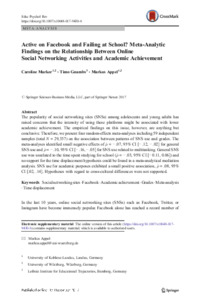Active on Facebook and Failing at School?Meta-Analytic Findings on the Relationship Between Online Social Networking Activities and Academic Achievement
|
 |
 Zusammenfassungen
Zusammenfassungen
The current paper presented four meta-analyses on the relationship between SNS use and
academic achievement. Our work underscores the notion that SNS use is positively
associated with academic achievement as long as SNS use is school-related. This is in
contrast to fears of many parents and teachers that the influence of SNS is inevitable
detrimental for academic achievement. SNS use unrelated to school, however, was
associated with poorer academic achievement. However, all correlations identified in
these meta-analyses were rather weak, only a small part of students’ achievement at
school and university co-varied with SNS use. A meta-analytic investigation of the time
displacement hypothesis found no support for the assumption that the intensity of social
media activities is associated with less time spent for studying. Despite the proliferation
of SNSs in societies around the world, social networking activities appear to be only
weakly related to academic achievement.
Von Caroline Marker, Timo Gnambs, Markus Appel im Text Active on Facebook and Failing at School? The popularity of social networking sites (SNSs) among adolescents and young adults has
raised concerns that the intensity of using these platforms might be associated with lower
academic achievement. The empirical findings on this issue, however, are anything but
conclusive. Therefore, we present four random-effects meta-analyses including 59 independent
samples (total N = 29,337) on the association between patterns of SNS use and grades. The
meta-analyses identified small negative effects of ρ^ = − .07, 95% CI [− .12, − .02] for general
SNS use and ρ^ = − .10, 95% CI [− .16, − .05] for SNS use related to multitasking. General SNS
use was unrelated to the time spent studying for school (ρ^ = − .03, 95% CI [− 0.11, 0.06]) and
no support for the time displacement hypothesis could be found in a meta-analytical mediation
analysis. SNS use for academic purposes exhibited a small positive association, ρ^ = .08, 95%
CI [.02, .14]. Hypotheses with regard to cross-cultural differences were not supported.
Von Caroline Marker, Timo Gnambs, Markus Appel im Text Active on Facebook and Failing at School?  Dieser wissenschaftliche Zeitschriftenartikel erwähnt ...
Dieser wissenschaftliche Zeitschriftenartikel erwähnt ...
 Dieser wissenschaftliche Zeitschriftenartikel erwähnt vermutlich nicht ...
Dieser wissenschaftliche Zeitschriftenartikel erwähnt vermutlich nicht ... 
 Nicht erwähnte Begriffe | Effektstärke, LehrerIn, Unterricht |
 Tagcloud
Tagcloud
 Zitationsgraph
Zitationsgraph
 Zitationsgraph (Beta-Test mit vis.js)
Zitationsgraph (Beta-Test mit vis.js)
 4 Erwähnungen
4 Erwähnungen 
- Digitalisierung in der Bildung - Bericht im Auftrag des Staatssekretariats für Bildung, Forschung und Innovation (SBFI) und der Schweizerischen Konferenz der kantonalen Erziehungsdirektoren (EDK) im Rahmen des Bildungsmonitorings (educa.ch Schweizerisches Medieninstitut für Bildung und Kultur) (2021)


- Digital lesen - Was sonst? (Andreas Gold) (2023)

- Bildung für eine digitale Zukunft (Katharina Scheiter, Ingrid Gogolin) (2023)


- Bildungsbezogene Medienrepertoires als Schnittstelle informeller und formaler Bildung - ein Überblick und neue Perspektiven für die Forschung (Michaela Kramer, Rudolf Kammerl, Katrin Potzel, Lutz Wartberg)


- Bildungsbezogene Medienrepertoires als Schnittstelle informeller und formaler Bildung - ein Überblick und neue Perspektiven für die Forschung (Michaela Kramer, Rudolf Kammerl, Katrin Potzel, Lutz Wartberg)
- Digital ist besser?! - Psychologie der Online- und Mobilkommunikation (Markus Appel, Fabian Hutmacher, Christoph Mengelkamp, Jan-Philipp Stein, Silvana Weber) (2023)


- Das Internet als Versuchskäfig? - Aufmerksamkeitssteuerung und Konditionierung (Markus Appel)



- Das Internet als Versuchskäfig? - Aufmerksamkeitssteuerung und Konditionierung (Markus Appel)
 Anderswo finden
Anderswo finden
 Volltext dieses Dokuments
Volltext dieses Dokuments
 |  Active on Facebook and Failing at School?: Artikel als Volltext ( Active on Facebook and Failing at School?: Artikel als Volltext ( : :  , 731 kByte; , 731 kByte;  : :  2021-03-21) 2021-03-21) |
 Anderswo suchen
Anderswo suchen 
 Beat und dieser wissenschaftliche Zeitschriftenartikel
Beat und dieser wissenschaftliche Zeitschriftenartikel
Beat hat Dieser wissenschaftliche Zeitschriftenartikel während seiner Zeit am Institut für Medien und Schule (IMS) ins Biblionetz aufgenommen. Beat besitzt kein physisches, aber ein digitales Exemplar. Eine digitale Version ist auf dem Internet verfügbar (s.o.). Aufgrund der wenigen Einträge im Biblionetz scheint er es nicht wirklich gelesen zu haben. Es gibt bisher auch nur wenige Objekte im Biblionetz, die dieses Werk zitieren.









 facebook
facebook Instagram
Instagram Multitasking
Multitasking Schule
Schule Schulerfolg
Schulerfolg social media / Soziale Medien
social media / Soziale Medien Twitter
Twitter
 Biblionetz-History
Biblionetz-History